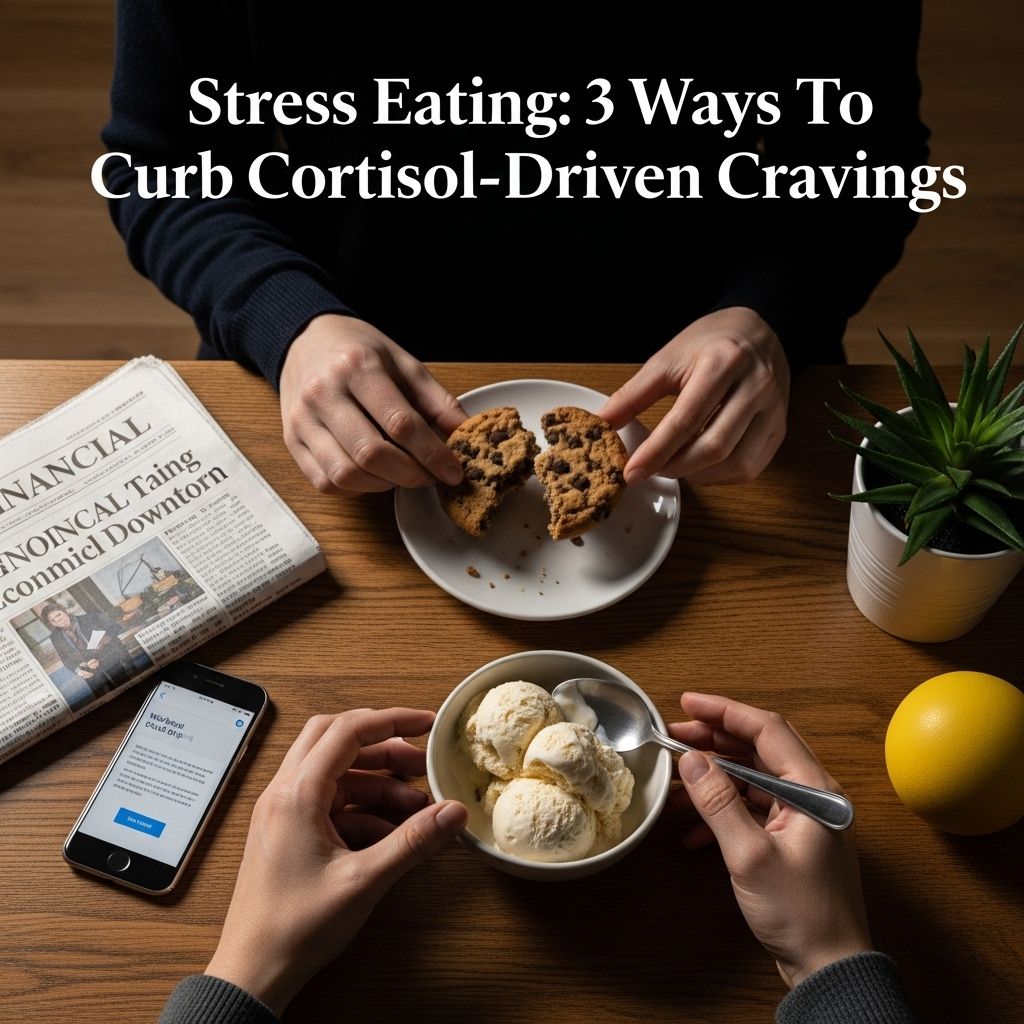Stress, Cortisol, and the Unmindful Snacking Connection
Mindful routines transform unplanned snacking into nourishing, balanced experiences.

Introduction to Stress, Cortisol, and Unmindful Snacking
Stress is a universal human experience, and it can significantly affect our eating habits. Many people find themselves turning to food when they are under stress, a phenomenon known as “stress eating” or “emotional eating.” This behavior is often linked to high levels of cortisol, a hormone released by the adrenal glands in response to stress. Understanding the mechanism behind stress-induced eating and its relationship with cortisol is crucial for developing strategies to manage weight and improve overall health.
Stress and Appetite Regulation
Stress can have a dual effect on appetite. Initially, it triggers the fight-or-flight response, which suppresses hunger due to the release of epinephrine (adrenaline). However, prolonged stress leads to increased levels of cortisol, which can stimulate appetite and lead to overeating, particularly of high-calorie, high-fat, or high-sugar foods. This shift towards consuming more palatable foods is partly because these foods provide temporary relief from stress and anxiety.
Cortisol’s Role in Appetite and Weight Gain
Cortisol affects not only appetite but also fat distribution and metabolism. Elevated cortisol levels can lead to increased abdominal fat, which is associated with higher risks of cardiovascular disease and diabetes. Moreover, cortisol’s role in appetite regulation often results in a preference for comfort foods, which can contribute to weight gain and obesity.
Stress and Food Preferences
- High-Cortisol Reactors: Individuals with high cortisol reactivity tend to consume more calories under stress, with a preference for sweet foods. This pattern can be problematic as it may lead to a cycle of overeating and weight gain.
- Comfort Foods: Stress increases the desire for comfort foods, which are typically high in fat and sugar. The brain’s reward centers are activated by these foods, providing a temporary sense of relief from stress.
- Ghrelin and Appetite: Ghrelin, the “hunger hormone,” also plays a role in stress-induced eating. Emotional eaters often have lower basal ghrelin levels but may experience persistent ghrelin stimulation during stress, leading to increased appetite and food intake.
Health Impacts of Stress Eating
Chronic stress eating can have significant health implications, including:
- Weight Gain and Obesity: Regularly consuming high-calorie foods under stress can lead to weight gain and obesity, increasing the risk of diabetes and cardiovascular diseases.
- Metabolic Changes: Elevated cortisol levels can disrupt metabolism and lead to increased abdominal fat deposition.
- Psychological Effects: Stress eating can create a cycle of guilt and further stress, affecting mental health and overall well-being.
Managing Stress and Unmindful Snacking
While it’s challenging to completely avoid stress, there are strategies to manage stress and reduce its impact on eating habits:
- Stress Management Techniques: Practices like meditation, mindfulness, and yoga can help reduce cortisol levels and improve stress resilience.
- Healthy Snacking: Choosing healthier snack options and being mindful of eating can help mitigate the effects of stress on appetite.
- Physical Activity: Regular exercise can reduce stress and improve overall metabolic health.
Conclusion
Understanding the connection between stress, cortisol, and unmindful snacking is crucial for maintaining a healthy lifestyle. By recognizing the triggers of stress eating and implementing strategies to manage stress, individuals can reduce their reliance on unhealthy comfort foods and mitigate the negative health impacts associated with chronic stress.
Frequently Asked Questions (FAQs)
Q: What are the primary causes of stress eating?
A: Stress eating is primarily driven by high cortisol levels, which increase appetite and preference for high-calorie foods. Additionally, stress often disrupts regular eating patterns, leading to overeating as a coping mechanism.
Q: How can I manage stress to reduce unmindful snacking?
A: Effective stress management includes practices like mindfulness, meditation, and regular physical activity. Maintaining a balanced diet and choosing healthier snack options can also help reduce the tendency to overeat during stressful periods.
Q: Can stress lead to weight loss as well as weight gain?
A: Yes, stress can lead to both weight loss and gain. Initial stress can suppress appetite due to the fight-or-flight response, leading to weight loss. However, prolonged stress typically results in increased cortisol levels, which stimulate appetite and can lead to weight gain.
Q: How does ghrelin affect stress-induced eating?
A: Ghrelin, the hunger hormone, plays a role in stress-induced eating, particularly in emotional eaters. These individuals may have lower basal ghrelin levels but experience persistent ghrelin stimulation during stress, promoting increased food intake.
Table of Content
- Stress and Appetite Regulation
- Stress and Food Preferences
- Health Impacts of Stress Eating
- Managing Stress and Unmindful Snacking
- Frequently Asked Questions (FAQs)
References
- https://pubmed.ncbi.nlm.nih.gov/11070333/
- https://www.health.harvard.edu/staying-healthy/why-stress-causes-people-to-overeat
- https://www.frontiersin.org/journals/psychology/articles/10.3389/fpsyg.2014.00434/full
- https://www.nature.com/articles/s41398-020-0729-6
- https://www.psychiatry.org/news-room/apa-blogs/how-stress-affects-eating-habits
- https://www.sharp.com/health-news/how-stress-affects-your-appetite
Read full bio of medha deb












